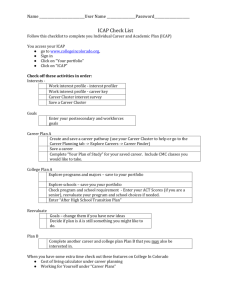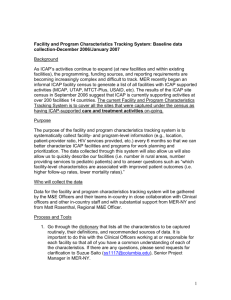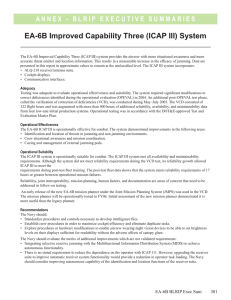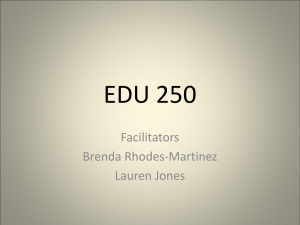Center Consolidated Schools, 26JT ICAP Policy Basic Instructional Program
advertisement
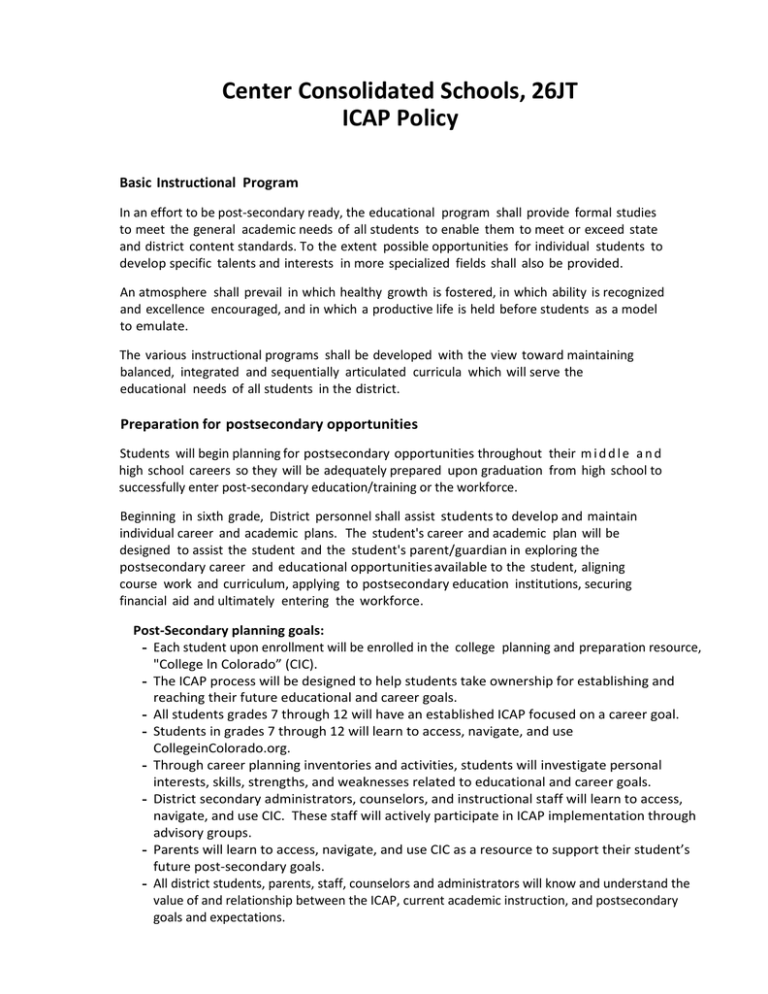
Center Consolidated Schools, 26JT ICAP Policy Basic Instructional Program In an effort to be post-secondary ready, the educational program shall provide formal studies to meet the general academic needs of all students to enable them to meet or exceed state and district content standards. To the extent possible opportunities for individual students to develop specific talents and interests in more specialized fields shall also be provided. An atmosphere shall prevail in which healthy growth is fostered, in which ability is recognized and excellence encouraged, and in which a productive life is held before students as a model to emulate. The various instructional programs shall be developed with the view toward maintaining balanced, integrated and sequentially articulated curricula which will serve the educational needs of all students in the district. Preparation for postsecondary opportunities Students will begin planning for postsecondary opportunities throughout their m i d d l e a n d high school careers so they will be adequately prepared upon graduation from high school to successfully enter post-secondary education/training or the workforce. Beginning in sixth grade, District personnel shall assist students to develop and maintain individual career and academic plans. The student's career and academic plan will be designed to assist the student and the student's parent/guardian in exploring the postsecondary career and educational opportunities available to the student, aligning course work and curriculum, applying to postsecondary education institutions, securing financial aid and ultimately entering the workforce. Post-Secondary planning goals: - Each student upon enrollment will be enrolled in the college planning and preparation resource, "College ln Colorado” (CIC). - The ICAP process will be designed to help students take ownership for establishing and reaching their future educational and career goals. - All students grades 7 through 12 will have an established ICAP focused on a career goal. - Students in grades 7 through 12 will learn to access, navigate, and use CollegeinColorado.org. - Through career planning inventories and activities, students will investigate personal interests, skills, strengths, and weaknesses related to educational and career goals. - District secondary administrators, counselors, and instructional staff will learn to access, navigate, and use CIC. These staff will actively participate in ICAP implementation through advisory groups. - Parents will learn to access, navigate, and use CIC as a resource to support their student’s future post-secondary goals. - All district students, parents, staff, counselors and administrators will know and understand the value of and relationship between the ICAP, current academic instruction, and postsecondary goals and expectations. ICAP Roles and Responsibilities o District Administration Ensure that ICAP is built into the regular school calendar. Provide sufficient resources to counselors for ICAP supplies, college visits and field trips, CIC customization, and professional development. Work with building administration to facilitate project implementation. o MS and HS Administrators Work with building staff and counselors to facilitate project implementation. Facilitate planning and implementation for the training of building staff. Develop and implement strategies to help staff to integrate ICAP into the curriculum and into the school calendar. Initiate activities to bring parents into the career planning process of their students. o Counselors Work with administrators and building staff to facilitate project implementation. Develop and implement strategies to help staff to integrate ICAP into the curriculum and develop ICAP plans for ICAP advisory groups that are aimed to help the student take ownership for establishing and reaching their future educational and career goals. Provide ongoing project training, support, and resources to building staff. Engage outside resources to support ICAP programming. Facilitate ICAP related college visits, career fairs, and field trips. Seek resources to support ICAP implementation. Annually review each student plan. Initiate activities to bring parents into the career planning process for their students. Provide information to parents/guardians about Colorado Commission on Higher Education (CCHE) admission requirements for institutions in Colorado as well as the courses the district offers that meet the CCHE admission requirements prior to the enrollment 9th grade year. Assist students in course selection based on student educational and career goals. Use CIC Professional Center to determine how many and how well students complete project goals and use existing homework policy to keep students accountable on a monthly basis. Evaluate ICAP impact through pre/post test analysis, post-secondary attendance analysis, and FAFSA completion. o Building Staff: Secondary enrollment staff will ensure that students are enrolled in an ICAP grade level advisory group and are assigned a room and advisor. Instructional staff will work with students to facilitate ICAP implementation. Attend trainings prior to designated ICAP days. Implement ICAP plans with fidelity. Develop and implement strategies and lesson plans to integrate CIC into the curriculum. Teach students to understand the relationship between the ICAP, current academic learning, and postsecondary goals and expectations. Train students to view their CIC accounts as a “living/changing” document that should be visited regularly. Ensure students assigned to advisory group have completed grade level requirements. Initiate activities to bring parents into the career planning process of their students, including facilitation of a student-led parent-teacher conference about ICAP. o Students: Understand the value of and relationship between the ICAP, current academic learning, and postsecondary goals and expectations. Explore career opportunities for the future Complete interest surveys in order to learn more about self Select an appropriate career cluster and career goal Create high school course plan based on the selected career cluster and goal Complete the designated yearly grade level requirements Post-secondary planning activity requirements: o In addition to grade level requirements, at a minimum, all students will annually do the following: Career Cluster and Interest Inventories Create post-secondary goals Research available careers and the educational requirements for each Research post-secondary educational options and the admission requirements for each, including attendance at a college fair or college visit Learn about financial aid and scholarship options Plan courses related to educational and career interests Do personal reflection based on current academic learning, ICAP activities, and future educational and career aspirations All students must satisfactorily complete Senior Seminar during senior year to graduate. LEGAL REFS.: C.R.S. 22-1-104 (teaching of history, culture and civil government) C.R.S. 22-1-108 through 22·1·110 (instruction on the federal constitution and the effect of use of alcohol and controlled substances) C.R.S. 22-25·101 et seq. (Colorado Comprehensive Health Education Act) C.R.S. 22-32-109 (1)(ff) (notice of courses that satisfy higher education admission guidelines) C.R.S. 22-32·109 (1)(nn) (career and academic planning for students beginning in ninth grade) C.R.S. 22·35·101 et seq. (Concurrent Enrollment Programs Act) CROSS REFS.: IKF, Graduation Requirements JIC, Student Conduct, and Subcodes 3 of 3
